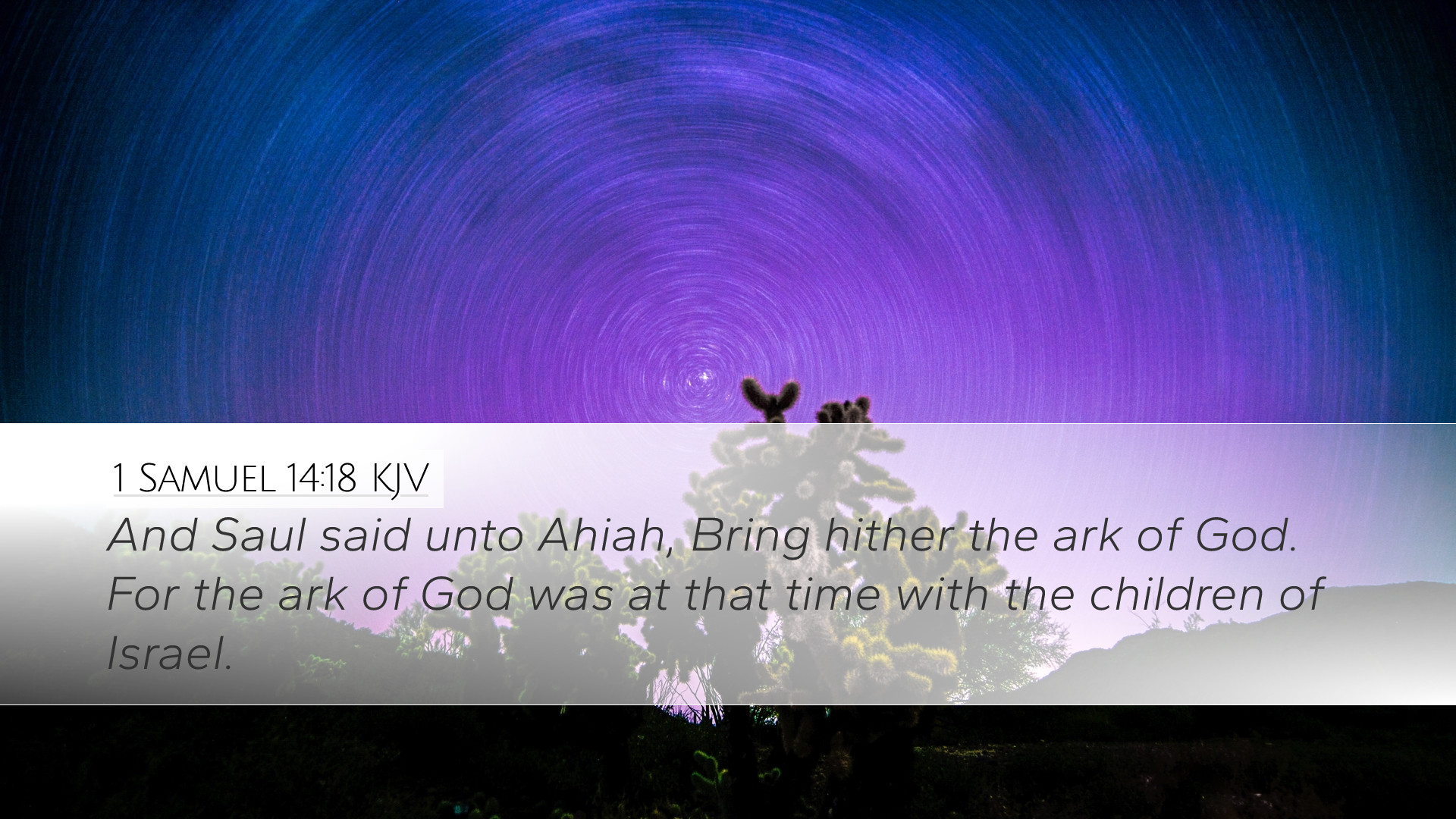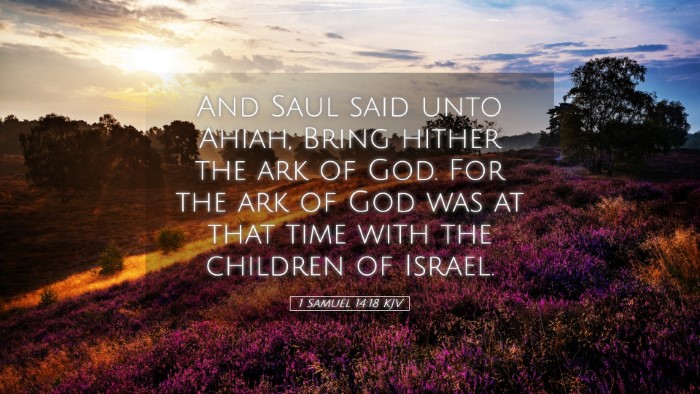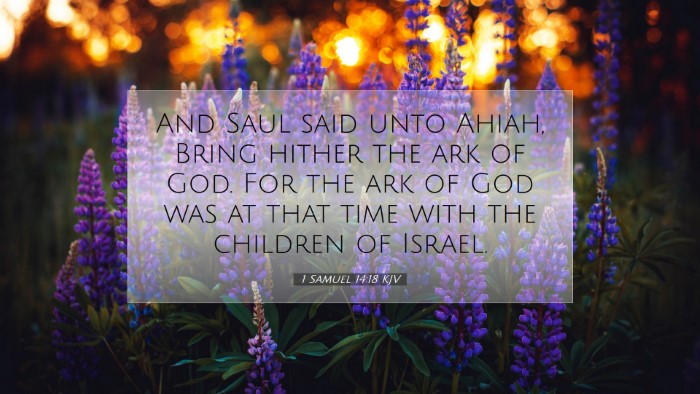Commentary on 1 Samuel 14:18
Verse Text: "And Saul said unto Ahijah, Bring hither the ark of God. For the ark of God was at that time with the children of Israel."
Introduction
This verse captures a critical moment in the tumultuous reign of King Saul during the Old Testament period. As the narrative unfolds, it is essential to understand the implications of this act of calling for the Ark of God amidst imminent conflict. The context involves the Philistine threat and Saul’s leadership decisions, shedding light on both historical and theological dimensions.
Contextual Analysis
To comprehend this moment, we must consider the broader context of 1 Samuel chapters 13 and 14. Saul, the anointed king, faces a crisis as the Philistines rally against Israel. His leadership and reliance upon divine assistance are brought into sharp focus. The Ark of the Covenant, representing the presence of God, had significant implications for the Israelites’ identity and spiritual life.
Matthew Henry's Insights
Leadership in Times of Crisis: Matthew Henry emphasizes Saul's call for the Ark as a moment revealing both his desperation and his desire to seek God’s favor in battle. Henry notes that Saul, under pressure, attempts to invoke the presence of God through the Ark, which signifies his recognition of the need for divine guidance.
Symbol of God’s Presence: Henry further elaborates on the Ark as a tangible symbol of God’s presence among His people. The act of bringing the Ark indicates Saul's awareness of the spiritual resources at his disposal, yet it also raises questions about whether his heart was genuinely aligned with God’s will.
Albert Barnes' Perspective
Historical Context: Albert Barnes comments on the historical significance of this request. He points out that the Ark had been captured by the Philistines and later returned. By referencing the Ark, Saul aimed to reassure his men of divine support, even as the ethical foundation of his leadership was unstable.
Seeking Divine Guidance: Barnes highlights the symbolic act of seeking the Ark as an appeal to divine providence. He notes that, in the Old Testament framework, the presence of the Ark was inherently linked to the victories of Israel. However, Barnes poignantly suggests that mere proximity to the Ark does not guarantee victory; it is the heart and devotion of the leaders and people that align with God’s purposes that truly matter.
Adam Clarke's Insights
Theological Implications: Adam Clarke delves into the theological implications of Saul’s request. He suggests that the Ark’s presence represents a means of accessing God’s blessing and power for Israel. Clarke warns, however, that such reliance can become ritualistic, potentially distancing individuals from genuine faith and dependence on God.
Leadership and Legacy: Clarke emphasizes the gravity of Saul’s leadership choices during this tense period. His decision to engage the Ark reflects a broader spiritual malaise in Israel, where leaders often oscillate between faith and fear. Clarke argues that this moment encapsulates Saul's struggle with faithfulness, ultimately highlighting the precarious nature of his kingship.
Theological Themes
- The Importance of Divine Presence: The Ark serves as a crucial reminder of God's desire to dwell among His people. For pastors and theologians, this emphasizes the need for a community to seek God earnestly and intentionally reflect His presence in their endeavors.
- Leadership Under Pressure: Saul’s actions exhibit the challenges leaders face in moments of crisis. They must navigate their reliance on God while maintaining faith and integrity amidst external pressures. This theme is particularly instructive for contemporary church leadership.
- Faith vs. Ritual: The moment encapsulates the tension between authentic faith and mere ritual participation. It calls leaders to evaluate their practices in worship and community life, ensuring they align with the core values of dependence on God rather than mere traditions.
Practical Applications
This commentary provides several key applications for today's spiritual leaders and communities:
- Prioritize Prayer: Just as Saul sought the presence of God during a crisis, leaders should prioritize prayer and spiritual discernment in ministry settings, particularly in challenging circumstances.
- Align Leadership with Divine Will: Evaluating decisions in light of scripture and God’s will is critical. Leaders should regularly seek to align their vision and actions with divine principles.
- Foster Genuine Worship: Communities should encourage worship practices that lead to authentic engagement with God, avoiding mere ritualism. This means nurturing a culture of prayer, reflection, and openness to the Holy Spirit.
Conclusion
1 Samuel 14:18 serves as a poignant reminder of the realities of leadership and the critical need for divine assistance in all aspects of ministry. By exploring the insights of Matthew Henry, Albert Barnes, and Adam Clarke, we uncover layers of theological understanding and practical applications that resonate deeply with contemporary spiritual leaders, students, and theologians. As we reflect on the actions of Saul, let us strive to lead with integrity, seek God earnestly, and foster genuine community worship that reflects His presence.


